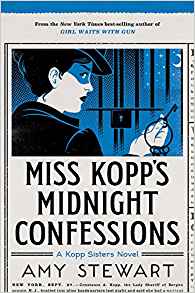Miss Kopp’s Midnight Confessions
The year is 1916. Edna Heustis, by anyone’s standards a good girl, is eating breakfast in a respectable boarding house for young ladies. Police rush in and arrest her. The charge is waywardness. Luckily for Edna, Constance Kopp—one of the first female deputy sheriffs in New Jersey—is in charge of the jail and its women inmates. Miss Kopp clearly sees the injustice of the charge and determines to get Edna released.
But Edna’s is not the only case she takes on. Next is Minnie, much less innocent but still she has only made the mistake of going off with the wrong man. The third woman, Miss Kopp’s younger sister Fleurette, has run away to join the chorus of a touring musical show. How can Fleurette be rescued without causing scandal?
Amy Stewart, who honed her fine research skills on a series of botanical books, has given readers a view of an uncomfortable period in American history. Young women seeking independence in the early years of the 20th century were easily accused of immorality and locked away in reformatories at the least possible hint. They were some of the first victims of women’s drive for independence. The book offers strong storytelling with believable characters. It presents the reader with gritty truths that are seldom comfortable but always intriguing.










